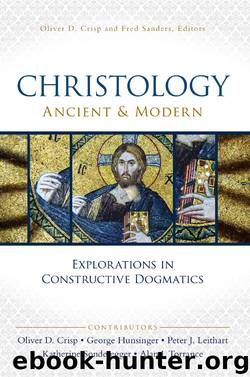Christology, Ancient & Modern by Oliver D. Crisp & Fred Sanders

Author:Oliver D. Crisp & Fred Sanders [Crisp, Oliver D.; Sanders, Fred]
Language: eng
Format: epub
ISBN: 9780310514978
Publisher: Zondervan
Published: 2013-03-13T16:00:00+00:00
CHAPTER 6
“WE SAW HIS GLORY”
Implications of the Sanctuary Christology in John’s Gospel
PETER J. LEITHART
SINCE THE FOURTH AND FIFTH CENTURIES, ecumenical creeds have provided the touchstone of Christological orthodoxy. Before the councils, there were no creeds, and the church fathers relied on biblical categories, concepts, and images to set the boundaries of Christian discourse, confession, and belief. Before the creeds, typology controlled Christology.
Typology did not disappear after the councils. Though Athanasius argues that extrabiblical terminology is legitimate insofar as it captures the sense of Scripture, even after Nicea he uses the Nicene homoousios infrequently. He commonly resorts to a set of biblical images that he describes as paradigms.1 There are four: The Son is the “radiance” of the Father’s glory (Heb 1:3); the Father is the “fountain of living waters” and the Son the stream from that fountain (Jer 2:13); the Son is son to the Father (many passages); and the Son is the Word and Wisdom of the Father (John 1:1–3; Prov 8).
From these raw materials, Athanasius constructs anti-Arian polemics. Fathers by definition have sons, and those sons are of the same nature as the father; therefore, if the Father is eternally Father, He must have a consubstantial, eternal Son. Light cannot exist without radiance, and so if the Father is eternal light and glory, He must have an eternal Radiance. That Radiance is the Son. Unless we wish to blaspheme the Father by saying He was once silent and foolish, we must say that Word and Wisdom of God are coeternal with Him. Scripture identifies that Word and Wisdom with the Son. A fountain without a stream is barren, and so as source the Father must eternally flow out in the Son.
These analogies do not work at every point, of course. Athanasius insists that an apophatic interval separates the created paradigm and the uncreated Father-Son relation. Analogies exist, but, Athanasius declares, “the divine generation must not be compared to the nature of men” (Discourses 1.8.28). Athanasius appeals to axioms concerning the eternity and immutability of God to distinguish legitimate from illegitimate implications of his paradigms. The Son is Son, Radiance, Stream, Word, Wisdom in all the ways that it is possible to be so for an eternal, immutable God. To say that the Son is a son does not imply that the Father existed before the Son, as it would if they were human. That would be inconsistent with God’s changelessness. But saying that the Father and Son share the same nature is not inconsistent with God’s immutability; in fact, quite the opposite. By denying the legitimate force of these paradigms, Arians not only reject the eternity of the Son but destroy God Himself because they imply that God is subject to change (from non-Father to Father). If there is a temporal or ontological interval between Father and Son, then before the Son the Father was an absurdity — a unradiant light, a divine fool, a speechless God, a Father without a Son.2
Athanasius also uses biblical paradigms constructively to work out a fuller understanding of Christ’s Person and Work.
Download
This site does not store any files on its server. We only index and link to content provided by other sites. Please contact the content providers to delete copyright contents if any and email us, we'll remove relevant links or contents immediately.
The Secret Power of Speaking God's Word by Joyce Meyer(3138)
Signature in the Cell: DNA and the Evidence for Intelligent Design by Stephen C. Meyer(3114)
Real Sex by Lauren F. Winner(3000)
The Holy Spirit by Billy Graham(2932)
The Gnostic Gospels by Pagels Elaine(2515)
Jesus by Paul Johnson(2347)
Devil, The by Almond Philip C(2320)
23:27 by H. L. Roberts(2236)
The Nativity by Geza Vermes(2217)
Chosen by God by R. C. Sproul(2148)
All Things New by John Eldredge(2145)
Angels of God: The Bible, the Church and the Heavenly Hosts by Mike Aquilina(1948)
The Return of the Gods by Erich von Daniken(1921)
Angels by Billy Graham(1914)
Knowing God by J.I. Packer(1841)
Jesus of Nazareth by Joseph Ratzinger(1795)
The Gnostic Gospel of St. Thomas by Tau Malachi(1778)
Evidence of the Afterlife by Jeffrey Long(1772)
How To Be Born Again by Billy Graham(1770)
